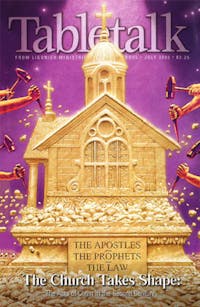
Request your free, three-month trial to Tabletalk magazine. You’ll receive the print issue monthly and gain immediate digital access to decades of archives. This trial is risk-free. No credit card required.
Try Tabletalk NowAlready receive Tabletalk magazine every month?
Verify your email address to gain unlimited access.
The church fathers and apologists of the second century spoke boldly to a pagan world about the truths of the Christian faith. Their words continue to speak, reminding us of our heritage, instructing us in the faith, and inspiring us to live as fearlessly as they did. There is one physician, both fleshly and spiritual, made and not made; God incarnate; true life in death; both of Mary and of God; first passible, then impassible; even Jesus Christ our Lord.
—Ignatius of Antioch
On the day called the Feast of the Sun, all who live in towns or in the country assemble in one place, and the memoirs of the Apostles or the writings of the Prophets are read as time permits. Then, when the reader has ended, the President instructs and encourages the people to practice the truths contained in the Scripture lections. Thereafter, we all stand up and offer prayers together. . . Our prayers being ended, we salute one another with a kiss. Then bread, and a cup of wine mixed with water, are brought to him who presides over the brethren. He, taking them, offers praise and glory to the Father of all through the Name of the Son and the Holy Spirit, and giving thanks at great length for that we have been counted worthy to receive these gifts from God; and when he finishes the prayers and thanksgivings all the people present cry aloud, Amen. . . After the President has given thanks and all the people have said Amen, those among us who are called deacons give to all present, sharing it among them, the bread and wine mixed with water.
—Justin Martyr
He came to earth from heaven for suffering man, becoming incarnate in a virgin’s womb from which He came forth as man; He took on Himself the suffering of suffering man through a body capable of suffering, and put an end to the suffering of the flesh, and through His spirit incapable of death He became the death of death, which is destructive of man.
—Melito of Sardis
The sacred books acknowledge with regard to Christ, that as He is the Son of man, so is the same Being not a [mere] man; and as He is flesh, so is He also spirit, and the Word of God, and God.
—Irenaeus
